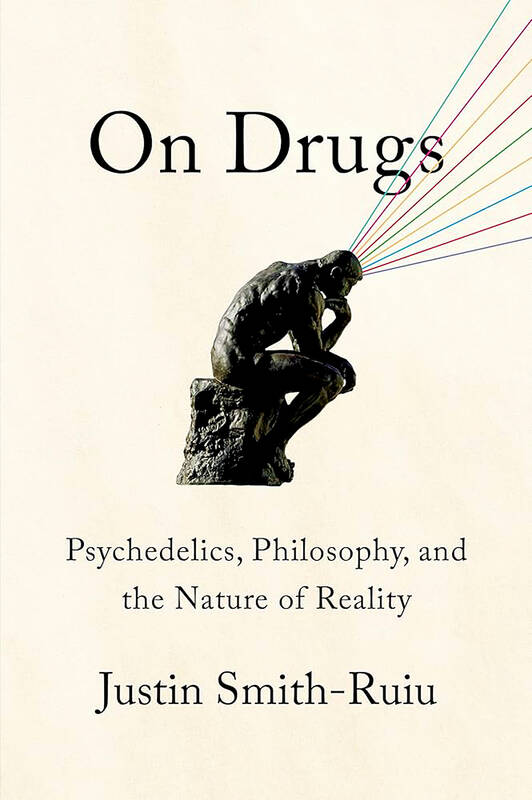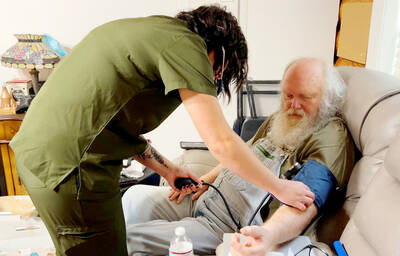This book is a trip. Among other things, it copiously details all the drugs that the US-born professor of history and philosophy of science at the Universite Paris Cite has ingested. They include psilocybin, LSD, cannabis; quetiapine and Xanax (for anxiety); venlafaxine, Prozac, Lexapro and tricyclics (antidepressants); caffeine (“I have drunk coffee every single day without fail since Sept. 13, 1990”); and, at least for him, the always disappointing alcohol.
The really trippy thing, though, is not so much Justin Smith-Ruiu’s descriptions of his drug experiences, but the fact that they’re written by a tough-minded analytic philosopher, one as familiar with AJ Ayer’s Foundations of Empirical Knowledge as Aldous Huxley’s mescaline-inspired The Doors of Perception.
Moreover, they’re presented with the aim of melting the minds of his philosophical peers and the rest of us by suggesting that psychedelics dissolve our selves and make us part of cosmic consciousness, thereby rendering us free in the way the 17th-century Dutch philosopher Baruch Spinoza defined it (paraphrased by Smith-Ruiu as “an agreeable acquiescence in the way one’s own body is moving in the necessary order of things”).

The melting metaphor is apt, since the primal scene of early modern western philosophy came when the 17th-century French thinker Rene Descartes melted a piece of wax. The lump may change its form, smell, length, breadth, and yet, Descartes supposed, we still claim to know that it is the same piece of wax. The knower can be wrong about all their perceptions involving this wax but not, Descartes argued, that they are thinking: this is the basis of his famous “I think therefore I am” — by means of which the French thinker made us the rational, science-venerating beings we have been ever since.
Smith-Ruiu, discombobulatingly, flips the script on the Cartesian thought experiment: what if, instead of melting the wax, Descartes had “melted his mind” with acid, or one of those hallucinogens starting to arrive in Europe across the Atlantic along with potatoes and tobacco, such as peyote or ayahuasca? What if he had not foregrounded rationality and instead extolled the imaginative powers that, Smith-Ruiu suggests, are unleashed by psychedelics? The west might have ended up seeing the world completely differently, and human beings as “infinite reservoirs of light and wisdom.”
There’s more in Smith-Ruiu’s psychedelic experience, one might say, than is dreamed of in strait-laced colleagues’ philosophies. His thinking seems kin to such voguish, mind-blowing movements as Markus Gabriel’s new realism, and Timothy Morton’s implosive holism and object-oriented philosophy. Immanuel Kant claimed the transcendent was by definition behind an impenetrable veil, inferable perhaps but never knowable. We could never, in this world, see God. For Smith-Ruiu, psychedelics might help lift that veil. For that thought alone I’m amazed — and cheered — that he got tenure.
It’s worth mentioning at this point that this is not one of those gonzo books typed while the author is out of their gourd. Smith-Ruiu is no Hunter S Thompson. It is called On Drugs but it was not written on drugs (apart, presumably, from some of the prescription meds he details above and the odd espresso hit). “I am as I write, sober, lucid and entirely focused on the task at hand.”
The book ends with a remarkable plot twist (philosophical spoiler alert!). In 2023, Smith-Ruiu attended Catholic mass for the first time in 40 years at the church next door to his Paris apartment. His claim here is that the psychedelic experience is analogous to that of ritual worship: ordinary time is interpreted as a distortion, and during mass one might perceive, as he did on mushrooms, something like eternity. Another parallel is that one submits one’s will in church as on a psychedelic trip.
“Psychedelics, like religion, like poetry are among other things an abandonment of the will to go it alone,” he writes.
Smith-Ruiu is self-aware enough to note how absurd this sounds: that psychedelics have become his gateway drug to the Catholic church.
And you don’t even need to take magic mushrooms from some geezer in a Dutch head shop (as Smith-Ruiu did) to melt your mind. He cites the opening of Proust’s novel A la Recherche du Temps Perdu, when little Marcel dreamily imagines that he has become some of the things he has been reading about before nodding off — a church, a quartet, the rivalry between Francois I and Charles V — as an example of everyday psychedelia.
That isn’t the only non-pharmaceutical way to expand your consciousness — you could try reading this extraordinary book, whose riches I can only hint at in this review.

President William Lai (賴清德) has championed Taiwan as an “AI Island” — an artificial intelligence (AI) hub powering the global tech economy. But without major shifts in talent, funding and strategic direction, this vision risks becoming a static fortress: indispensable, yet immobile and vulnerable. It’s time to reframe Taiwan’s ambition. Time to move from a resource-rich AI island to an AI Armada. Why change metaphors? Because choosing the right metaphor shapes both understanding and strategy. The “AI Island” frames our national ambition as a static fortress that, while valuable, is still vulnerable and reactive. Shifting our metaphor to an “AI Armada”

When Taiwan was battered by storms this summer, the only crumb of comfort I could take was knowing that some advice I’d drafted several weeks earlier had been correct. Regarding the Southern Cross-Island Highway (南橫公路), a spectacular high-elevation route connecting Taiwan’s southwest with the country’s southeast, I’d written: “The precarious existence of this road cannot be overstated; those hoping to drive or ride all the way across should have a backup plan.” As this article was going to press, the middle section of the highway, between Meishankou (梅山口) in Kaohsiung and Siangyang (向陽) in Taitung County, was still closed to outsiders

The older you get, and the more obsessed with your health, the more it feels as if life comes down to numbers: how many more years you can expect; your lean body mass; your percentage of visceral fat; how dense your bones are; how many kilos you can squat; how long you can deadhang; how often you still do it; your levels of LDL and HDL cholesterol; your resting heart rate; your overnight blood oxygen level; how quickly you can run; how many steps you do in a day; how many hours you sleep; how fast you are shrinking; how

“‘Medicine and civilization’ were two of the main themes that the Japanese colonial government repeatedly used to persuade Taiwanese to accept colonization,” wrote academic Liu Shi-yung (劉士永) in a chapter on public health under the Japanese. The new government led by Goto Shimpei viewed Taiwan and the Taiwanese as unsanitary, sources of infection and disease, in need of a civilized hand. Taiwan’s location in the tropics was emphasized, making it an exotic site distant from Japan, requiring the introduction of modern ideas of governance and disease control. The Japanese made great progress in battling disease. Malaria was reduced. Dengue was